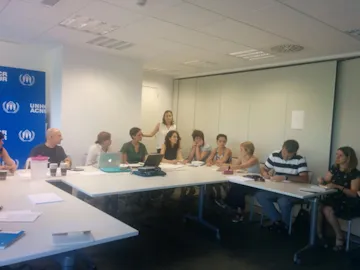Lack of Data and Need for Specific Policies: Major Challenges in Asylum

The NIEM project meets with the main stakeholders dealing with the reception of asylum seekers and refugees
On July 11th, CIDOB held the first NIEM Advocacy Meeting in Madrid with the collaboration of UNHCR Spain. The event took place at the UNHCR headquarters and was attended by the main social organisations working in the asylum field (the Red Cross, CEAR, ACCEM, La Merced Migraciones, IOM, Red Acoge, Proyecto Esperanza, Provivienda, Amnesty International, Fundación Cepaim, FELGTB and Programa LGTBI).
After introducing the NIEM project to the attendees, the discussion focused on the main challenges involved in the reception of asylum seekers and refugees in Spain. In particular, the organisations highlighted:
- The lack of data on who the applicants are and those who have international protection, where they are and in what conditions, and data for the analysis of the impact of the policies put in place.
- The legal precariousness of asylum seekers, who have to renew their red card (the document received when their application has been declared admissible and which authorises them to work and reside in Spain) every 6 months, which increases the difficulty of accessing housing and work.
- The lack of knowledge about refugee status among the wider population and among workers in the public administration and the private sector, in particular; and the prejudices and discrimination connected to this.
- The need for specific policies, as asylum seekers and refugees often do not meet the requirements for policies aimed at the general population (e.g., access to social housing).
- The need to pay particular attention to the situation of particularly vulnerable groups (e.g., LGBT and victims of trafficking), as well as the specific conditions of those in Ceuta and Melilla.
The NIEM project, of which CIDOB is the leader in Spain, began in November 2016 with the aim of improving the quality and effectiveness of the refugee integration processes in the EU.